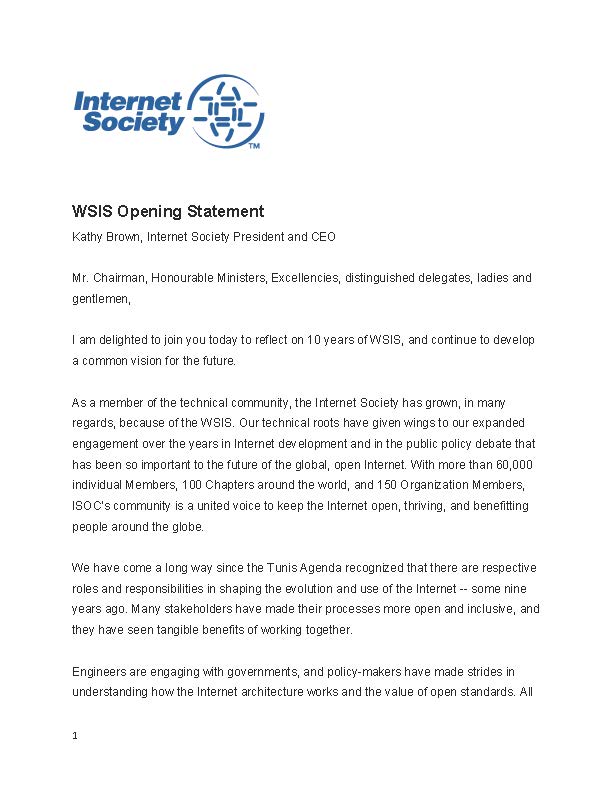WSIS Opening Statement
Kathryn Brown, Internet Society President and CEO
Good afternoon all. Mr. Chairman, Dr. Touré, Ministers, distinguished delegates, all of you,
It is a delight to join you here today to reflect on 10 years of WSIS, and to work with this global community to continue to develop our vision for the future.
As a member of the technical community, the Internet Society has grown, in many ways, because of the WSIS. Our technical roots have given wings to our expanded engagement over the years in Internet development and in the public policy debates that have been so important for the future of the global, open Internet. With more than 60,000 individual Members, 100 Chapters around the world, and 150 Organization Members, ISOC’s community is a united voice to keep the Internet open, thriving, and benefitting all people of the globe.
We have come a long way since the Tunis Agenda recognized that there are respective roles and responsibilities in shaping the evolution and use of the Internet ecosystem. Many stakeholders, including many governments, have made their processes more open and inclusive, and they have seen tangible benefits because of that.
Engineers are engaging with governments, policy-makers have taken great strides in understanding the Internet architecture and how it is very different from the telephone architecture. We are appreciating together the value of open standards. All of us have made considerable progress in understanding each other and working toward shared outcomes.
Cooperation and collaboration have been essential to our success. The technical community, the public policy community, the inventors, the innovators, the commercial providers and, importantly, the USERS of Internet services have come together in ways that have transformed our world and our collective thinking.
In recent months, the NETmundial Conference in Brazil illustrated a practical application of the multistakeholder principles we talk about. The technical community, users, governments, business, human rights advocates stood shoulder to shoulder, on a level floor, talking with each other, listening to each other, working in the spirit of cooperation that said: “We can do this together!” This consensus building model works. The Internet Governance Forum (IGF) similarly, is evolving its bottom up processes to produce more tangible outcomes, to widen its dialogue with policy-makers while keeping its inclusive non-negotiating nature that has proved so valuable.
The critical question for the next decade will not be WHETHER or IF, but HOW diverse stakeholders can work together for the common vision for the post-2015 era.
There may not be a one-size-fits-all multistakeholder model that is identical from region to region, or from one institution to another. But all multistakeholder approaches should be linked by common principles of openness, inclusiveness, and transparency.
The WSIS Outcome documents that will be adopted at this conference were the result of real conversations between all the stakeholders. While discussions have been intense at times on some of our issues, our key takeaway is the need to keep talking. The need to keep dialogue open, amongst all of us – this is not only a principle that is cherished by the Internet technical community, but one of the founding principles of the United Nations.
If we are to meet the economic and social development promise of an ever evolving Internet and to ensure a trusted, secure, and resilient Internet for everyone, it is our collective responsibly to build new partnerships and to deepen our collaboration, and the Internet Society stands with you to do that.
Thank you.
